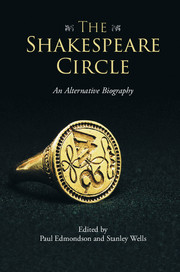Book contents
- Frontmatter
- Contents
- List of illustrations
- List of contributors
- Preface and acknowledgements
- General introduction
- Part I Family
- Part II Friends and Neighbours
- 12 A close family connection: the Combes
- 13 Schoolfriend, publisher and printer Richard Field
- 14 Living with the Mountjoys
- 15 Ben Jonson
- 16 Richard Barnfield, John Weever, William Basse and other encomiasts
- 17 Last things: Shakespeare's neighbours and beneficiaries
- Part III Colleagues and Patrons
- Closing remarks
- Afterword
- Index
- References
17 - Last things: Shakespeare's neighbours and beneficiaries
from Part II - Friends and Neighbours
Published online by Cambridge University Press: 05 November 2015
- Frontmatter
- Contents
- List of illustrations
- List of contributors
- Preface and acknowledgements
- General introduction
- Part I Family
- Part II Friends and Neighbours
- 12 A close family connection: the Combes
- 13 Schoolfriend, publisher and printer Richard Field
- 14 Living with the Mountjoys
- 15 Ben Jonson
- 16 Richard Barnfield, John Weever, William Basse and other encomiasts
- 17 Last things: Shakespeare's neighbours and beneficiaries
- Part III Colleagues and Patrons
- Closing remarks
- Afterword
- Index
- References
Summary
Concerned most of all, it seems, with the protection of his property holdings in the face of a family scandal and a lack of male heirs, Shakespeare's will, his last legal act in the final months of his life, looks mean-minded, unsympathetic, chaotic. We see hasty revisions, likely prompted by the sexual misconduct of his new son-in-law Thomas Quiney and the anticipated death of his sister Joan's husband, and the puzzling omission and later insertion of the bequest to his wife. The same process is at work in the several lines on page two of the will, where Shakespeare, with small gifts of money and keepsakes, recompensed his Stratford friends and neighbours for services rendered and favours done, and discarded those that had offended. To Francis Collins, gent. (1573–1617), who was responsible for drawing up the will and a witness, £13 6s 8d; to Thomas Russell, esq. (1570–1634), appointed overseer with Collins, £5; to William Reynolds, gent. (1575–1633) and to Hamnet Sadler (c. 1562–1624), godfather to Shakespeare's dead son and a witness (both added as an afterthought), 26s 8d each to buy memorial rings; to brothers Anthony Nash, gent. (d. 1622), and Mr John Nash (d. 1623), 26s 8d each (‘in gold’ struck out); to William Walker (1608–61), Shakespeare's godson, 20s in gold. Mr Richard Tyler the elder (1566–1636) was struck out. Julyns or July or Julius Shaw (1581–1628), John Robinson (fl. 1589–1616) and Robert Whattcott (fl. 1593–1637) served as witnesses without reward.
Shakespeare's will was drafted, according to the date at the top of the first page, on Thursday 25th of January 1616 and then revised two months later on Monday 25th March, a coincidence as potentially suspect as the date of his birth and death both falling on 23 April. Perhaps advised by Francis Collins, a burgess of Stratford from 1602 to 1608 and town clerk in 1617, who had acted for him in a number of legal transactions and had a reputation locally as a maker of wills to the great and good of Stratford, Shakespeare started working on his will three months before he died.
- Type
- Chapter
- Information
- The Shakespeare CircleAn Alternative Biography, pp. 213 - 230Publisher: Cambridge University PressPrint publication year: 2015

